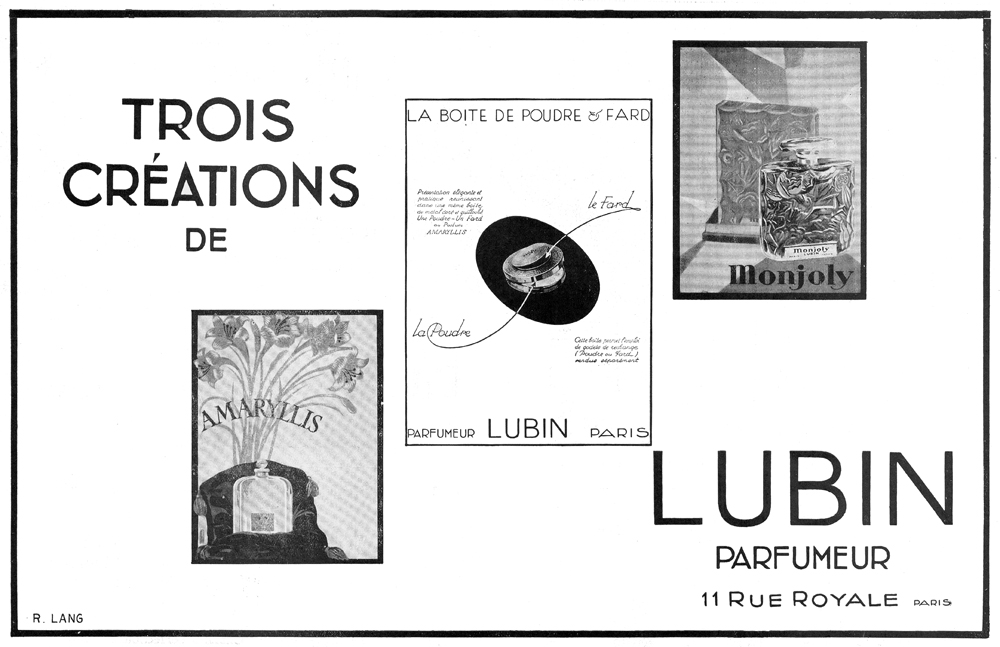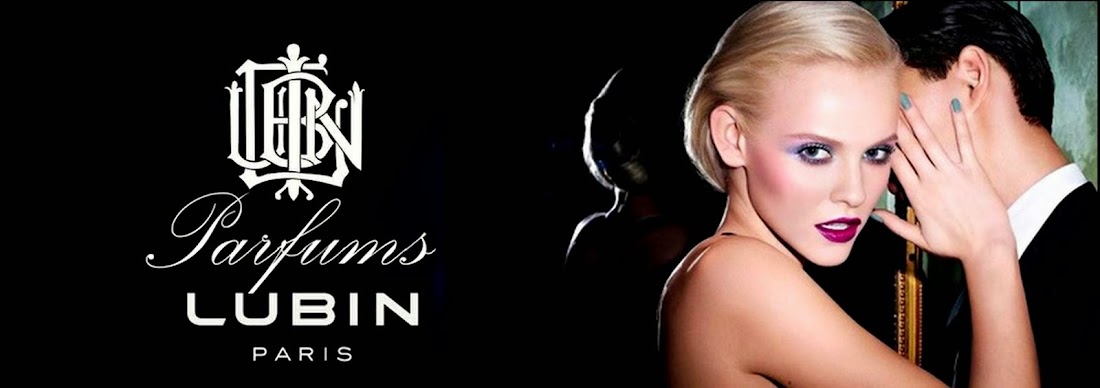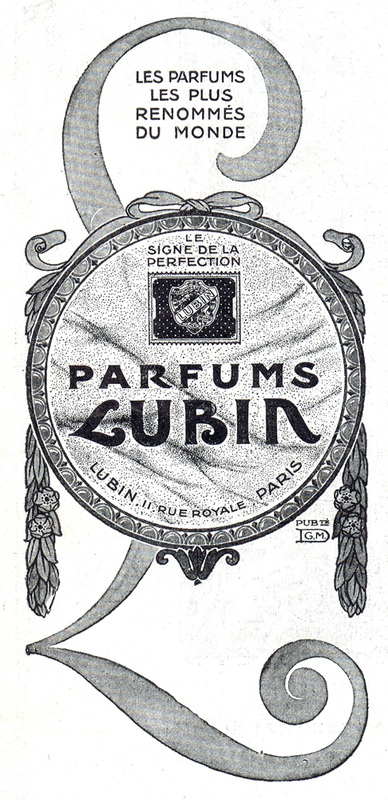Lubin was established at 11 rue Royale, Paris in 1798 by Pierre-Francois Lubin as "Aux Armes de France", a perfume boutique that produced a range of fragrant lotions, powders and toilet waters.
Pierre-Francois Lubin was originally a merchant who became a perfumer in 1792 after being trained for ten years in Grasse by Francis Tombarelli.
Lubin claimed ownership and use of all the secret beauty formulas of the French court.
His success was so great that in the 1800s, Lubin became the favorite supplier of most European royal courts. He was appointed Perfumer to Princess Pauline Borghèse in 1807 and in 1821 Perfumer to King George IV, who had given many rare and costly perfumes to Mrs Fitzherbert, his lover and later wife when he was Prince Regent. Lubin also provided perfumes to the Emperor of Russia.
In 1824 Felix-Andre Prot (1811 to 1885) became Lubin's apprentice, Eugene Rimmel's father, H. Rimmel was also apprenticed there. Later Felix-Andre Prot succeeded Lubin after his death in 1853 and the company passed onto his heirs in 1885 and Felix's son Paul joined the company. and became Paul Prot & Cie around 1900.
Felix Prot
The house of Lubin was the first to solicit the North American market, aiming at the plantation culture of the South. A depot was established in London and distributed by Chandon of New York. Lubin Inc. established in 1928. As of 2005, Lubin has created about 465 fragrances to date.
Company closed in mid 1980's. Company re-established in 2004/5; launched 'Idole de Lubin' in 2005 - other re-issues followed.
Time Line:
- 1774 - Pierre-François Lubin born
- 1788 - Started perfumery training with Francis Tombarelli
- 1790 - Moved to Paris to further train with Jean-Louis Fargeon
- 1792 - Pierre-François Lubin officially graduated as a perfumer
- 1798 - Pierre-François Lubin opened a shop "Aux Armes de France" at 55 rue St Anne
- 1807 - Pierre-François Lubin appointed Perfumer to Princess Pauline Borghèse
- 1821 - King George of England, appointed Lubin the perfumer to Britain's court
- 1824 - Felix-Andre Prot started his apprenticeship at Lubin
- 1827 - Pierre-François Lubin left his shop, and was under the control of M. Saffers, but the store retained the name Parfumerie Lubin
- 1830 - Lubin products first exported to North America and opened American branches
- 1844 - Felix-Andre Prot took over the business as Lubin left no heirs
- 1853 - Pierre-François Lubin dies
- 1855 - Paul Prot, son of Felix, became manager of the company
- 1856 - Company was renamed Parfumerie Lubin, Felix Prot & Co
- 1860 - Chardin took over the firm
- 1867 - Felix Prot & Cie again resumed control and a factory was built in Cannes to process raw materials
- 1873 - Lubin registered their trademark in the USA
- 1885 - Paul Prot, son of Felix took over the firm and renamed it Parfumerie Lubin, Paul Prot & Cie
- 1900 - Paul Prot expanded the business and moved it to 11 rue Royale, and a factory was built in Courbevoie
- 1902 - Parfumerie Lubin was distributed in the USA by sole agent George E. Evans of New York
- 1920 - Paul Prot handed the company over to his sons Marcel and Pierre
- 1929 - Stock market crash hit Lubin hard
- 1937 - Nuit de Longchamp perfume created, its success brought back wealth to the firm
- 1945 - Pierre's son Paul Prot and his cousin Andre joined Lubin
- 1960s - Lubin was sold and the company changed ownership again
- 1970s - Lubin temporarily owned by Henkel
- 1984 - Lubin was traded to Muelhens
- 1987 - Company was relaunched to the public by Muelhens
- 1994 - Sold to Wella AG, became a subdivision of Cosmopolitan Cosmetics GmbH
- 2003 - Acquired by Proctor and Gamble
- 2004 - Gilles Thévenin acquired the company and resurrected the opulence and luxury that the brand was sorely lacking for the last 30 years
Today, the Lubin boutique is located at 21 rue des Canettes, Paris
The International Studio, Volumes 1-2, 1897:
"There is a quiet little street in Paris with a quaint Old World air of sedateness about it, where the tides of time have run but slowly during the past century. Scarcely two squares from the great artery of the Avenue de l'Opera, and but little more from the famous place of the same name, where events that shook the whole civilized world have swirled and eddied, the Rue St Anne has remained placid, and industrious Empires have arisen, tottered and crashed in thunderous ruin, but its white capped workmen have rarely failed to pass along it to their work.
Shops of the fashion of a century ago, curious old counting rooms, and busy workshops are to be found on this thoroughfare. There are not many signs along the Rue St Anne, for business does not seek there to thrust itself across the pavement to seize the passer by. Of the few, there are many are so aged as to be nearly undecipherable, and others still have little interest. There is one modest carte however, that while scarcely more than a name never fails to arrest the stray American stroller in the French capital. It is above the door of No. 55 and spells simply the word Lubin.
Since 1798, the same name has been above the door, and since the early years of the present century, there have been few strangers from a land so remote, as not to recognize this name as an old acquaintance. This simple name breathes the languorous luxury of many a dainty boudoir, and revives recollection of stately courts, where gracious grande dames and gallant courtiers thronged. Amidst all the glamorous associations of romance and revolution, imperial splendors and martial glories, which cluster thick around the name of Paris, there is a niche apart for this name. It is redolent of the soft seductive fragrance permeating many a brilliant salon, or filling the crowded drives of the Bois de Boulogne, where the Haute Monde is out of a fair Spring afternoon. Like a page of Thackeray's ballads, it exhales the sweetness which youth and passion have thrown around the grisette haunted Bohemia of the Quartier Latin, which the ballad writer sang, and Du Maurier immortalized.
It was nearly a century ago in 1798, when M. Pierre Francois Lubin entered the quiet little Rue St Anne, and settling himself in the little building at No 55 commenced the manufacture of the famous scents, extracts, toilet waters, and other preparations which bear his name. Their excellence has caused his name to be as well known to day, as that of the young military director, who at the head of the cockaded hordes of the Republic, at the time he commenced was smiling with iron hand, the monarchies of the Continent.
The beginnings of the perfumery trade in Paris, when the little open air shops or booths around the Carnavalet Museum, were the most pretentious establishments of the perfumers were not so far behind, M. Lubin and the field he entered, was far less known than it is to day. The long bearded philosophers of the school, which sought the touchstone, had departed broken hearted, leaving their retorts and crucibles, and more valuable still, considerable knowledge of chemistry behind them. Following on there, arose the alchemy of fragrance, the magic which caught and transformed the subtle sweetness of the Indian bloom, and held the essence of the Rose suspended. Among all those who started with the century, the name of Lubin, alone stands. To the trade, it typifies formulae, wonderful in combinations and skill, to the outside world, it represents success.
The modest little establishment in the Rue St Anne throve and grew steadily. From the unpretentious counting house, commenced to go forth, bills of shipment, all over the civilized world. Monarchs might set nations at each other's throat, but they never permitted themselves to suffer. So early as 1821, King George of England, appointed the wizard Frenchman across the water, perfumer to Britain's court, as his house still is to the greater Britain today .
Workmen who began with M. Lubin in 1798, more expert as time wore on, remained, and only the chosen few of promise were taken in to the famous little distillery of fragrance where he was master. Among these came in 1824, a boy apprentice, Felix Prot.
Beginning at the very bottom, he rose steadily. The secrets which for nearly a century have baffled the whole scientific world, were slowly revealed to him and a few others. Three years later, venerable with years and honors, M. Lubin left the shop of the Rue St Anne, but he left also his name and his secrets. Others succeeded to the work he laid down, but to the world, it has always been Lubin the master. The single and wonderful extract, or combination of extracts, known as Jockey Club, is famous wherever the refinements of civilization have penetrated. There is but one Jockey Club, and its subtle fragrance has never been approached. So with many other scents, equally famous. In these days when the fierce competitions of trade have forced prices down to a point never before known, it is a striking guarantee of excellence, when a single cake of soap, the famous Rose, can sell at $1.25. Rose soaps are not so rare, but there is but one that bears the name of Lubin, and far years enough could not be made to supply the demand.
Since 1827, when Lubin became the name only of the establishment of the Rue St Anne, there have been the changes in the old firm that time and the mortality of man enforce. Until 1844, M. Saffers controlled its destiny, and then the boy apprentice of twenty years earlier, M. Felix Prot, assumed the business. Under him it grew to a fame even wider than ever before dreamed possible. Letters dated 1845 and 1856 containing orders for soap and perfumery show M. Lubin the Parfumeur du Roi and the history of successful trade tells how orders piled upon orders until the file in the little counting house ran months and months ahead. As begun then, so it has since been. Without going over their threshold, the proprietors of Lubin's have taken the business that the world poured in upon them.
In 1856, it became M. Felix Prot & Co, and from then until 1860 it remained the same. During the latter year, M. Chardin became the firm and so continued until 1867, when M. Felix Prot & Cie again resumed control. Since then there has been but the one inevitable change, the succession of Paul Prot, son of Felix, to the seniority. The commodious offices at No 42 Fourteenth Street, Union Square south, are filled with the same fragrance that fills the great establishment of today in the Rue St Anne. Lubin's has an American home, and its American friends have not been slow to find it.
In the bewildering profusion of perfumes to day it is refreshing to return to originals whose genuineness has formed the basis of the present trade. There are certain scents famous to day under many labels which in 1798, and at intervals since, have originated in the Rue St Anne and continued unchanged in their manufacture Anne since by the same house. One of these, Jockey Club, has already been mentioned. Others of the same sort that in which Lubin stands preeminent, are Heliotrope Blanc, Violette, Peau d'Espagne, Frangipane, Patchouli, Verbena, Ylang Ylang, White Rose, New Mown Hay, and Ess Bouquet Lubin. The famous Eau de Toilette of Lubin stands side by side with the Lavender Water Royal, so widely known. Eau de Cologne, Triple Extract, is as distinctively Lubin's as are the famous soaps, one of which has already been mentioned.
Among the more exclusively boudoir preparations, are the wonderful Poudres pour la Toilette, which grading up through the Violette and Rose, to the satin like Blanc de Perle Superfine, are known wherever feminine beauty enhances its charms, and the male exquisite finds equal consolation in the shaving creams of Ambroisie, Almond and Lettuce, the Cosmetic Hongroise, and the delicate waxes which also bear Lubin's label. Almost equally well known are the preparations for the hair, the Eau de Quinquina, Perfumed Glycerine, Superfine Pomades and Perfumed Oils which the Parisian hairdresser uses in such profusion.
That "imitation is the siucerest flattery" is evidenced in the Lubin products by the persistent counterfeiting of them by unscrupulous competitors. The genuine articles bear the trade mark which is shown above THE HOUSE OF LUBIN. "















Hi, I have found a Lubin Paris powder compact in an antique shop today. I’d not heard of Lubin before so consulted google and found this site! I recognise it as the same one in the advert pictured above and wondered if you can tell me roughly what the date of production was? It is a little tarnished but you can make out the name and it still has the original blusher puff in it. Thank you
ReplyDelete